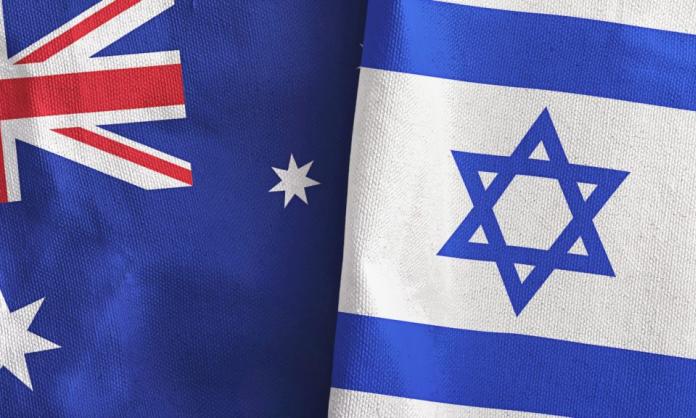As Israel launches a murderous offensive designed to make Gaza unlivable through bombing, starvation, thirst and a ground invasion, Australian Foreign Minister Penny Wong declares her solidarity. “We stand with Israel, and we always will”, she tells the Australia-Israel Chamber of Commerce.
Israel’s attacks turn hospitals and their surroundings into scenes of horror. President Biden supplies the bombs and embraces Netanyahu, the butcher in chief. Albanese turns up to joke around and feast with the Bidens. His condemnation is reserved for protesters, not state-level murderers. His government can’t even bring itself to call at the UN for a ceasefire.
Officials from Australia’s Department of Defence smirk their way through questions about the 322 permits issued for military exports to Israel over the past six years. None of them are at risk of being cancelled. The Financial Times reports that Israel’s bombing campaign matches or surpasses many of the most brutal conventional bombing attacks in history.
Penny Wong mutters platitudes about “international humanitarian law and the conduct of military operations in a lawful manner” as if they mean something. A genocide unfolds.
This is nothing new. Australia’s unwavering support for Israel has stood out internationally for decades.
What explains this strident support for Israel—shared by Australia’s main political parties, the security establishment, business elite and mass media?
Many people point to an “Israel lobby”. More recently, Australia and Israel’s common foundation as “colonial settler states” has emerged as a widespread explanation. It’s worth looking at both of these approaches, as well as a Marxist explanation based on Australia’s and Israel’s roles within a world order dominated by imperialism.
There is certainly no shortage of lobbying on behalf of Israel in the corridors of power, in Australia and throughout the world. But the idea that this lobbying effort explains the Australian state’s support for Israel has some obvious problems. For starters, it can’t explain why pro-Israel lobbying would be even more successful in Australia than in other countries (as reflected in Australia’s UN votes, where it’s common to find Australia alongside only a tiny handful of states that refuse to condemn Israel’s crimes).
It’s also implausible that major foreign policy and military entanglements are decided by whoever has the best lobbying effort. The US and Australia sank countless billions of dollars into the brutal war in Vietnam in the 1960s and 1970s. But a researcher would search in vain for any lobbying effort by business or political interests linked to South Vietnam that could explain this military involvement. Both Australia and the US did a brisk business with the brutal dictatorship of General Suharto of Indonesia—but no-one suggests this is explained by an “Indonesia lobby”. We could extend this list indefinitely.
The idea of an all-powerful “Israel lobby” also underplays what’s at stake in the alliance with Israel, and what would be required to change it. After all, if it’s just a lobbying effort that’s required, why not just fundraise for better pro-Palestine lobbyists?
Most versions of the “Israel lobby” theory rely on the idea that lobbying has distorted the “true” (and by implication, less appalling or less violent) interests of the US empire, in the Middle East and throughout the world. This is nonsense, as US commentator Norman Finkelstein argues:
“The claim that Israel has become a liability for US ‘national’ interests in the Middle East misses the bigger picture. Sometimes what’s most obvious escapes the eye. Israel is the only stable and secure base for projecting US power in this region. Every other country the US relies on might, for all anyone knows, fall out of US control tomorrow.”
The US learned this lesson in 1979 when the shah of Iran, a crucial ally in the region, was overthrown by a revolution. There was a further reminder in 2011, when a wave of popular uprisings shook regimes throughout the region, overthrowing the 30-year rule of Egypt’s pro-US dictator Hosni Mubarak. Israel, by comparison, has remained a stable and powerful state aligned with US interests.
Another reason offered as an explanation for the strength of the Australia-Israel alliance is the fact that both states were founded on the dispossession of indigenous people. Is what we’re seeing a common bond between colonial settler states, partners in the crime of genocide?
The strength of this approach is that it points to something structural about both societies, rather than just happenstance or good lobbying. But once we look closer, Indigenous dispossession doesn’t really check out as an explanation for Australia’s strident support for Israel.
In the recent UN vote calling for a ceasefire, Australia’s abstention is matched by the abstention of Canada. The US voted “no”. But New Zealand, also established as a colonial settler state, voted for the ceasefire. So did Indonesia, which has an active program of settling internal migrants from Java into West Papua to displace the indigenous population—recognised as a form of genocide—and China, which does the same thing in Xinjiang.
The list of countries that voted in favour of the ceasefire includes Belgium, with its bloodstained imperial history, and France, which still maintains an imperial presence in sub-Saharan Africa and the Pacific.
The list of countries that abstained along with Australia includes India, which, over the past 30 years, has become a firm ally of Israel. This move accelerated under the rule of Prime Minister Narendra Modi, who wants to construct a Hindu chauvinist state with parallels in the Zionist project.
Also on the list of abstainers are Italy, Denmark, Japan, the Philippines, Poland, Sweden, Ukraine and the United Kingdom. We can say many things about all of these countries—but none of them were ever colonial settler states. There is simply no clear line between the former colonisers and the former colonial states to explain policies towards Israel.
A thought experiment reinforces the point. What stops the Australian government from suspending all of the 322 licenses issued for exports of military equipment to Israel in recent years, and instead only sending “defence” material to states that profess opposition or neutrality towards Israel?
Of course, such a move is unthinkable for the entire political, business and military establishment. But this is not due to some vast unshakable level of support among Australia’s population for the colonial settler project of Israel: this doesn’t exist, as Israel’s rather shaky polling numbers show. Rather, any such proposal is a non-starter because it would endanger the holiest of holies of Australian military and foreign policy: the US alliance.
All of this points in the direction of a much more convincing explanation for the strident support for Israel among Australia’s ruling elite: the respective roles of the two countries in the US imperialist project.
A century ago, Russian revolutionary Vladimir Lenin described imperialism as “the highest stage of capitalism”. As capitalism developed, interdependent structures of finance, production and state power—including military power—hardened into rival blocs of capital and military might. Since the late 1800s, these blocs have competed over the entire surface of the Earth—economically, politically and militarily—in pursuit of profit and power.
The result has been repeated and enormously bloody wars between rival imperialist powers. These include World War One and World War Two (20 million and 70 million dead), followed by decades of nuclear-armed competition between the US and the USSR (the Korean War costing 3 million lives, the US-sponsored war in Vietnam maybe 4 million).
Then there are the blood-soaked decades of US dominance since the end of the Cold War.
No-one really knows how many Iraqis died as a result of the US invasions of Iraq in 1991 and 2003, and the years of crippling sanctions in between. In 1996, a journalist from the US 60 minutes program asked Madeleine Albright, then US ambassador to the UN, about reports of massive infant mortality resulting from the sanctions. “We have heard that half a million children have died”, asked the journalist. “Is the price worth it?” Albright replied: “I think this is a very hard choice, but the price, we think the price is worth it”.
What’s half a million dead kids—or dead anyone—when the US empire is at stake?
Now a US empire in relative decline is faced with China, a fast-rising rival for imperial dominance in Asia and potentially beyond. In a repeat of the arms race that led to World War One, all of the powers are now preparing for war.
This is the system of imperialism. The particular place of Israel, and of Australia, in relation to the most powerful imperialist states—the British and then the American empires—explains the unquestioned level of support for Israel among Australia’s ruling elite.
Israel and imperialism
After World War One, the map of the Middle East was redrawn by the victorious powers. The British government issued the Balfour Declaration in 1917, declaring support for the establishment of a “national home for the Jewish people” in Palestine.
Ronald Storrs, the British military governor of Jerusalem at the time, wrote that the aim was to create a “loyal Jewish Ulster in a sea of potentially hostile Arabism”. This recalled the earliest colonial project of Britain. From the 1600s, Protestant settlers from England and Scotland were granted land in the province of Ulster, in the north of Ireland, at the expense of the existing Gaelic (and largely Catholic) population. Surrounded by hostile forces, the settlers were dependent on the imperial centre for military defence—and therefore zealously loyal to the empire’s interests.
The British government intended Zionist settlement in Palestine to work in the same way. For example, Winston Churchill wrote: “[A] Jewish state under the protection of the British Crown ... would from every point of view be beneficial and would be especially in harmony with the truest interests of the British Empire”.
The main interest of the British Empire in the region was the Suez Canal, owned by British and French shareholders. However, even at this time, oil was a factor. The forerunner of British Petroleum had begun oil production in Persia (modern-day Iran) in 1908. Churchill, as secretary of the navy, began the shift to oil rather than coal before World War One, to free the navy from the political claims of Britain’s increasingly militant coal miners.
After World War Two, the US replaced Britain as the world’s greatest imperial power. And the new state of Israel aimed to fulfil a vital role in the postwar division of the world. Israel’s daily newspaper Haaretz editorialised in 1951:
“Strengthening Israel helps the Western powers to maintain equilibrium and stability in the Middle East. Israel is to become the watchdog. There is no fear that Israel will undertake any aggressive policy towards the Arab states when these would explicitly contradict the wishes of the US and Britain. But if for any reasons the Western powers should sometimes wish to close their eyes, Israel could be relied upon to punish one or several neighbouring states whose discourtesy to the West went beyond the bounds of the permissible.”
These were no idle words.
In 1956, Egypt’s nationalist ruler Gamal Abdel Nasser seized control of the Suez Canal. In response, Israel cooperated with Britain and France to attack Egypt. The “Suez crisis” ended in fiasco when the US demanded an end to the attack: the US was cautious about offending Arab rulers and was opposed to the “old” empires of Britain and France reasserting themselves in the region. Nonetheless, Israel demonstrated its ability to be of service to the Western powers.
The turning point came in 1967, when Israel attacked Egypt and then Jordan and Syria, defeating them in just six days. A US State Department document celebrated this win over nationalist Arab regimes:
“Israel has probably done more for the US in the Middle East in relation to money and effort invested than any of our so-called allies and friends elsewhere around the world since the Second World War. In the Far East we can get almost nobody to help us in Vietnam. Here the Israelis won the war, single-handedly, have taken us off the hook and have served our interests as well as theirs.”
In the wake of this, the US decided to back Israel to the hilt: annual US aid jumped from $13 million in 1967 to $600 million in 1972. Since that time, the US alliance with Israel has been one of the cornerstones of US Middle East policy. A US weapons airlift ensured Israel’s victory against its Arab neighbours in the 1973 Yom Kippur war; another airlift assisted with Israel’s 1982 invasion of Lebanon.
Ronald Reagan’s secretary of state, Alexander Haig, reportedly described Israel as “the largest American aircraft carrier in the world that cannot be sunk”. In 1986, then Senator Joe Biden declared: “Were there not an Israel, the United States would have to invent an Israel to protect our interests in the region”. President Biden repeated these comments during a recent visit to Israel.
As well as having a reliable military ally that can help to shape the region in its interests, the US gets other benefits from its alliance with Israel: weapons and surveillance. As Anthony Lowenstein documents in his recent book The Palestine Laboratory, access to high-tech weapons and spyware developed in Israel is an incentive for states to keep on the good side of both Israel and its most important ally, the US.
Sometimes a US ally is so bloodthirsty that the US government faces domestic obstacles to openly supporting the regime. In these cases, Israel can step into the breach. The former apartheid regime in South Africa and various US-sponsored dictatorships in Latin America have benefited from this sort of arrangement at various times.
Though Israel is a cornerstone of US foreign and military policy, it is no mere puppet. Left-wing historian Joel Beinin recently noted that Israel is “a full partner” in a grouping with Saudi Arabia, Egypt, the United Arab Emirates and Morocco: “an axis of reaction is aligned with, but not fully obedient to, the United States”.
For instance, Israel has been half-hearted in its support for the US-led support for Ukraine, mainly because Israel relies on security coordination with Russia in neighbouring Syria. Various US presidents might have preferred a little more stability in the occupied Palestinian territories, rather than an expansion of settlements and recurrent bloody and potentially destabilising slaughters in Gaza.
But this is a minor cost that the US is prepared to incur—especially when the price is largely paid in Palestinian blood and land. “The price”, as Joe Biden’s great friend Madeleine Albright once said, “is worth it”.
Like the Zionists in Israel, the rulers of Australia have always relied on the support of powerful imperialist backers—first the British, more recently the US—to guarantee their interests against potentially hostile rivals in “their” part of the world.
Far from being dragged unwillingly into imperialist competition and war, Australia’s rulers have from the start been enthusiastic promoters of their own imperial interests—which required the assistance of a more powerful imperialist force. As socialist historian Tom O’Lincoln wrote in Class and Struggle in Australia: “Colonial Australia did not support imperial aggression because its politicians were lapdogs. They acted in the calculated self-interest of the ruling class”.
To secure crucial shipping routes against potential rivals (France and Russia, and later Germany and Japan), Australia’s colonial ruling class was constantly involved in schemes that it hoped would deepen Britain’s involvement in the region. Hence the campaign by the Melbourne Age for Victoria to annex Fiji in the 1860s, and Queensland’s government sending a party to New Guinea to raise the British flag in 1883.
Enthusiastic participation in every possible imperial military adventure served the same purpose. Military detachments from the Australian colonies fought with British forces in Sudan (1885) and South Africa (1899-1902).
So by the time Labor Party leader Andrew Fisher declared in 1914 that Australia would fight with the British Empire through the slaughter of World War One “to our last man and our last shilling”, he was just the latest in a long line of enthusiastic imperialists in the political class, loyally serving the interests of Australian capitalism.
The US displaced the British as the most powerful empire on Earth after World War Two. Australia’s rulers worked hard to draw the US further into the Asia-Pacific. Contrary to the popular left-nationalist myth, Australia wasn’t “dragged into” the Vietnam War. In fact, Australia’s political and military establishment manoeuvred and lobbied to persuade their US counterparts to send ground troops to Vietnam in 1965, as documented in Michael Sexton’s history War for the Asking.
Labor Prime Minister Bob Hawke’s volunteering of frigates for the first US-led Gulf War in 1991, and his successor John Howard’s equally enthusiastic participation in subsequent wars in Iraq and Afghanistan, followed the same logic. “We are paying our dues now”, wrote military expert Paul Dibb in 1998, “in case we require American assistance in the future”.
The most important contribution Australia makes to the US empire is hosting surveillance bases, especially the Pine Gap base near Alice Springs. The important role that Pine Gap plays in US and Israeli surveillance and war-fighting capabilities in the Middle East is documented in a recent article by Peter Cronau on the Declassified Australia website. He quotes a former employee of Pine Gap who states that the facility “is monitoring the Gaza Strip and surrounding areas with all its resources, and gathering intelligence assessed to be useful to Israel”.
It’s not hard to join the dots—or rather, the trails of blood, corpses, profits and power. Since the earliest days of the Australian colonies, Australia’s rulers have depended on an alliance with the world’s greatest imperialist powers—Britain and then the US. The US alliance is the holy of holies for the Australian ruling class.
The rulers of the US empire similarly rightly regard Israel as one of the foundation stones for their whole edifice of profit and power. It’s this that rules out any serious challenge to the Australia-Israel relationship for Australia’s rulers. Strident support for Israel alongside the US at the United Nations is one relatively low-cost way for Australia’s political establishment to show its unswerving devotion to the US empire globally.
An alliance rooted so deeply in the interests of Australia’s rulers will not be easily destroyed. It takes a lot to stop an imperialist war, or preparations for imperialist war or the alliances that make such a war possible—because all of these things stem from the most powerful military, political and profit-fuelled interests that drive the capitalist system.
Australia’s alliance with the US is a key part of the preparations for the next world slaughter, as the US tries to head off any possibility of a challenge from China. Given the crucial role of Israel in the US empire, Australia’s ruling elite will continue their obscene embrace of Israel, regardless of how many Palestinians are killed, maimed, starved or jailed in any particular week.
It’s clear that Israel’s horrific attacks in Gaza are the prelude for further imperialist slaughters. The timeline is far from set, but the trajectory is towards war. All of the great powers, and their junior partners such as Australia, are preparing for it. The tectonic plates of rival imperialisms are grinding against each other. At the start of this year, the United Nations declared that the world is now seeing “the highest number of violent conflicts since the Second World War”.
This is cause for determination for the long struggle ahead, rather than despair.
The colossal ongoing protests in solidarity with Palestine show that millions worldwide are appalled that our rulers and their political servants, like the Labor Party, maintain their support for Israel even as Israel’s military rains down horror and death on millions of civilians.
There are times when movements against imperialist war have given rise to great waves of revolt and radicalisation – from the tumult and revolution (in Russia and then in Germany) that finally ended World War One, to the radicalisation that spread around the world as the US and Australia were defeated by a peasant army in Vietnam. But how far these revolts go depends in large part on what political forces succeed in steering them.
Capitalism produces war and preparations for war. It’s a system that produces genocides that unfold hour after horrific hour and year after desperate year – all in the service of profit and the power of a tiny minority. Anyone who wants to rule this system has to swear loyalty to its demands – like Labor – “to the last man and the last shilling”.
By contrast, those of us who want to see an end to imperialist war and genocide have a very different task: to build socialist political forces dedicated to overthrowing the system that produces these horrors.








